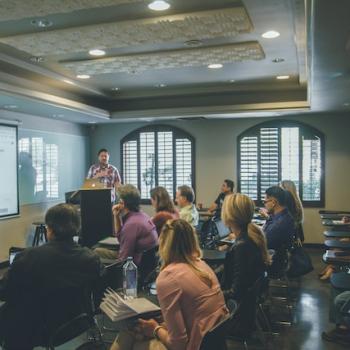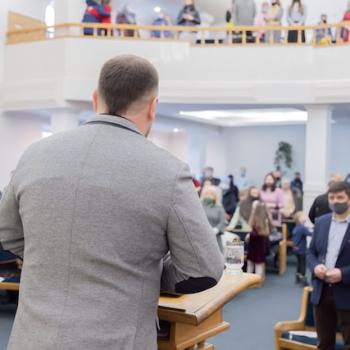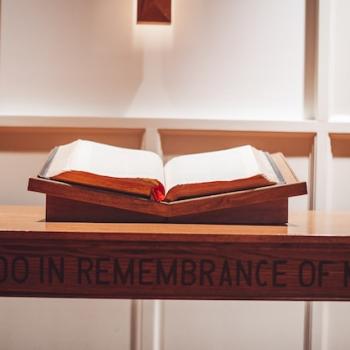
As I watched the recent docu-series The Secrets of Hillsong, I found myself thinking: It’s not just Hillsong. Hillsong is only one example.
Yes, Hillsong was particularly massive—and massively influential. But it is not unique. Really, Hillsong is just one especially dramatic and egregious example of all the authority issues I’ve been reflecting on here.
Mixing Religious Authority With God’s Authority
For one thing, I’ve written about how important it is to remember that religious authority figures are not God—and to avoid acting like they are.
This is what I see in the Hillsong exposé. It’s an environment of high control.
At Hillsong College in Australia, for example, former students shared that they were expected to reveal every aspect of their private personal lives to the college authorities. And they were at real risk of getting kicked out of school if anything they talked about didn’t line up with Hillsong leadership’s views of “moral” behavior.
Ironic, really. Because a student could get kicked out, say, for being gay—while in the meantime Hillsong leaders were abusing finances, covering up pedophilia, and engaging in a multitude of other behaviors that were actually immoral.
It seems bonkers and a little out there. And yet. As I’ve written, I think about my college ministry colleague who was asked to uproot her life and move to a different school.
And, eerily similar to the Hillsong college students, back in the day I participated in internship interviews with Christian organizations that wanted to know all about my sex life. (At the time, nonexistent. But also none of their business.)
It’s not just Hillsong.
Coerced Volunteering
At Hillsong New York—and probably other branches too; this was just the site the documentary focused on—people were spending 40-60 hours per week volunteering for the church.
One such volunteer shared a story about a time she was seriously ill and traveling, and felt compelled to complete her church volunteer tasks (remotely) anyway. No one expressed appreciation for this; it was simply assumed. No one was looking out for her wellbeing, suggesting that she take time off to care for herself. It was simply expected that she pour her entire heart, soul, and mind—and most of her waking hours—into this (unpaid) work, at the expense of her own health if need be.
This sort of thing feels egregious.
Then again, I remember a time when I felt lucky to be working for a ministry organization. I had bought into the organization’s mindset that this was some of the best work anyone could be doing. So we didn’t need livable wages, right? Apparently lots of other young people agreed with me, because it’s a large organization with a ton of staff.
I remember a ministry staffer a few years older than me who didn’t have health insurance. He learned a brutal lesson when an expensive sports injury left him with thousands of dollars in unexpected medical bills. He was giving his whole life to the ministry organization. But no one was taking care of him.
It’s not just Hillsong.
Bitter Fruit
This is some of the bitter fruit that grows when religious authority figures get conflated—or conflate themselves—with God.
Devotion looks like doing exactly what they say. (Certainly not what they do, but that’s seen as beside the point.) Faithfulness looks like working full time for the church with no pay.
These things might be more extreme at Hillsong than many other evangelical churches. But they aren’t particularly unique. It’s all part of the same system of control.
And so, in response, we need to learn to authorize ourselves.
We need to learn to engage with authority in different, healthier ways. We need to learn to exercise our “no” muscles.
Hillsong’s authority issues are just another form of the casual authoritarianism that runs rampant in so many churches, so much of the time. I hold out hope that if I’m hesitant to let a preacher tell me what to “turn and say to my neighbor” in church, I might be more hesitant to follow along when a church leader expects me to join him in covering up his father’s pedophilia (a la Brian Houston)—or in spinning other convenient, power-protecting lies (a la Carl Lentz’s admission that “sometimes we chose narrative over truth”).
Healthier Approaches to Churches’ Unhealthy Sides
I’m only scratching the surface, here, of the “secrets” explored in the documentary. I’ve reflected on a few more aspects of it over on my personal blog. But, since I’ve been spending a lot of time in this space reflecting on churchy authority and its many complications, I wanted to highlight some of the parts of the Hillsong documentary that might help us think about how power works in church.
My hope is that, for those of us who choose to stay in church, we can learn to interact in healthier ways with churchy authority’s unhealthy sides.
And I hope that thinking deeply about these kinds of things—uncomfortable as it may be—can help us figure out how to build different kinds of faith communities, together.
Because—I’ll say it one more time—it’s not just Hillsong.












